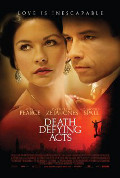
Directed by
Gillian Armstrong
100 minutes
Rated PG
Reviewed by
Bernard Hemingway

Death Defying Acts
Synopsis: It’s the 1920s and world famous magician and escape artist Harry Houdini (Guy Pearce) arrives in Edinburgh his manager (Timothy Spall) home of Mary Magarvie (Catherine Zeta-Jones) who has a cheap psychic cabaret act with her young daughter (Saoirse Ronan). When Houdini offers a $10,000 reward to anyone who can contact his late mother and repeat what she told him on her deathbed, Mary snaps into action.There’s no denying that Gillian Armstrong's latest film is impressively well crafted, with Cezary Skubiszewski's score, Gemma Jackson's production design, Haris Zambarloukos's photography and Nicholas Beauman’s editing all working together seamlessly with Armstrong’s characteristically tasteful direction. But fine as all these elements are, the nett effect of their combination is to obscure the most interesting ideas adumbrated in the script by Tony Grisoni and Brian Ward. These revolve around truth and illusion, the concealed and the revealed, vulnerability and invulnerability and the search of the human heart for true love in this veil of tears.
Using the historical persona of Houdini and taking the world of magic as its context certainly makes for an interesting vehicle by which to explore these themes but the film stays safely within the very familiar confines of the historical romantic drama instead of attacking them at the performative level. Which is to say that if we appreciate the idea of the two main characters finding real love and some measure of self-understanding through their brief encounter we do not experience it dramatically. Whatever does happen emotionally, happens off-stage with the characters reporting back on their feelings. This lack of dramatic directness is most clearly brought home by the final encounter between Harry and Mary in the cemetery that is nudged along by a summing-up voice-over from the daughter, Benji, who has acted as the film's narrator, with all the limitations that implies, and some generically tear-stained mise-en-scène from Armstrong.
If aesthetically the film tends to be over-stuffed, the casting is also problematic. It is hard to separate Catherine Zeta-Jones' hustling cabaret “artiste”, Mary, from her Velma Kelly in Chicago (2002) and she at no times seems a likely denizen of the lower rungs of Edwardian Edinburgh society in which, one assumes, a bath would have been an unlikely domestic appliance. Guy Pierce is equally photogenic and does suggest someone tormented by his demons but more neurasthenically so than would seem suitable for a man given to chaining himself underwater. Whatever the historical reality may be, his Houdini comes across more as a suffering artist than a world class showman. Timothy Spall who is so good in Mike Leigh territory is wincingly awful as Houdini’s stereotypically cynical and gruff manager, his accent sliding all over the place from the East End to Eastern Europe. If there is one performer who does stand out it is Saoirse Ronan who plays Mary’s independently-minded daughter with great self-possession and provides the point of view for the story.
Impressively staged but dramatically distanced Death Defying Acts offers a reasonable show but not one that will take your breath away.

Want more about this film?


Want something different?




